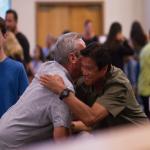
Food is a great opportunity to bring friends, family, and community together, but it’s about more than just getting together, talking, and eating.
Jewish young adults who attend a Shabbat dinner are more likely to feel fulfilled and accepted when compared to those who do not attend, according to a recent study by the OneTable Research Advisory Board and Benenson Research Group released in June 2022.
Before we go further into the study, for the unfamiliar, Shabbat is a holy day in the Jewish religion that beings at sunset every Friday and ends when the sun sets the following Saturday. Shabbat is considered a day set aside to worship and gather in commemorating the 7th day of creation when God rested. Keeping the Sabbath is one of God’s 10 commandments. For Orthodox Jews, there are three Shabbat meals — Friday dinner, Saturday lunch, and a meal in the late afternoon on Saturday. For non-Orthodox Jews, the Friday dinner is the focus of the celebration.
A Shabbat dinner is typically a multi-course meal consisting of soup, fish, meat or poultry, side dishes, and a dessert. The meal begins with challah, braided bread, and wine. Some of the foods served at Shabbat dinner are cholent, kugel, chreime, chamin, and bourekas. All of the links in this section go to recipes, which can help you become more familiar with the dishes and try some for yourself.
More than 2,700 Jewish-American young adults across more than 15 cities were asked about their feelings on a variety of topics in November and December 2021. Of these people, 1,938 were participants in OneTable, an organization that connects Jewish adults and hosts for a Shabbat dinner. The remaining 814 were Jewish people who were not a part of the program.
Two of the key findings in the study centered around whether the participants felt loneliness and felt rejected either all of the time or often. In the participant group, there were 14% who said they felt that way vs. 35% in the non-participant group when it came to feeling alone. For rejection, the totals were 11% and 30%, showing that Shabbat has a much greater positive effect beyond just a gathering to celebrate a holy day. It also gave youth the tools required to form greater and healthier social connections.
There were a host of other benefits for the participants of OneTable, including a larger understanding of their heritage and Judaism, and being more attuned to social issues than those who did not attend the Shabbat dinner. The report is quite interesting, and I suggest you give it a read.
Probably more important is that it further proves that gatherings – whether religious in nature or not — are important for everyone. Loneliness and rejection are burdens that people should work to lift from others. Food is just a portion of these gatherings, but everyone likes to eat, so why not bond and grow over some bourekas? Regardless of what faith you follow, find a way to invite people to gather and build a stronger community. If you are someone who feels like they have nobody, consider contacting organizations like OneTable or contact a local place of worship to see if they offer a similar gathering.












